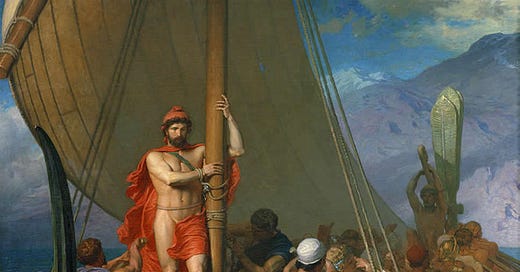Léon Belly, via Wikimedia Commons.
Have you heard of seasteading? It’s my favorite kind of thought experiment: a seemingly ridiculous idea that raises urgent questions about what a country could or should be.
For those not familiar, seasteaders hope to establish independent states on floating platforms on the high seas. The idea is that since international waters aren’t under any individual state’s exclusive jurisdiction, a new country could exist there without invading another state’s turf. I don’t think it’s a huge generalization to say that most of these thinkers lean libertarian (they were once funded by Peter Thiel!) although the guys running the seasteading institute have claimed otherwise. I wrote about their annual festival, Ephemerisle, some years ago for n+1, if you would like to read more about their philosophy.
Seasteading is intellectually compelling because it could, in theory, change everything: imagine what might happen if anyone, from a group of climate refugees to Elon Musk, could start their own country. Instead of being stuck in the place of their birth, people could “vote with their feet” and leave home to make more money, be free to practice their religion, or take part of a radical experiment in exiting. If citizens were truly free, the theory goes, nations would be forced to govern better simply to have people to govern.
The thing is, even if you set aside the technical and financial challenges to this vision, you can’t always rely on citizens to behave like consumers or corporations. Maybe a minority would—the target demographic for seasteading, for starters—but I don’t think it’s a safe bet to assume that ordinary people will pick out a country the way they’d pick out a vacuum cleaner.
That cuts both ways: any diplomat will tell you that countries don’t operate with this logic either, and that international relations aren’t as straightforward as markets (any economist worth their salt would probably say the same.) That’s in part thanks to the sticky, ill-defined and brittle notion of national sovereignty, whose breach—real, perceived, or imagined—can provoke some of the most disproportionate actions imaginable.
Chad and Nadia Elwartowski, an American-Thai couple known as “the first Seasteaders”, learned this the hard way. Last year, they shacked up in a floating “pod” about 14 miles from the coast of Phuket, Thailand. They were hoping use it to test out and hopefully prove that living autonomously, outside territorial waters, was not only possible but desirable.
Not two months later, the couple wound up fleeing a raid by the Thai navy. They then absconded to Panama to avoid facing serious charges for violating Thai sovereignty. You are probably wondering how the hell the couple could afford these follies. The answer is Bitcoin.
On one hand, the saga of Chad and Nadia exposes how leaky (if I may) the concept of seasteading is in a world where countries will take every opportunity to wield power and assert their sovereignty. But Thailand’s reaction also reinforces something libertarians believe: that the state is the source of most, if not all oppression, and that there’s practically no way to escape it. I obviously don’t have a Thai security clearance, but Chad and Nadia don’t seem like a major threat to national security: judging from their online presence, they enjoy cooking, small dogs, memes, and cryptocurrencies. Unless I’m missing something, the raid on their pod was clearly more symbolic than substantial.
Now, Chad and Nadia are taking a slightly more conventional approach to striking out on their own. Chad has bought a 800-foot, 777-cabin cruise ship, (re)named the MS Satoshi, and is auctioning off cabin-condos for $25,000-$50,000. Future cabin-owners will form a community “for digital nomads, cryptocurrency enthusiasts, expats, researchers, and entrepreneurs”. Several digital currencies, along with U.S dollars, will be accepted, and while there is self-service laundry, they are currently looking for someone to start a wash-and-fold business onboard. It’s not entirely clear to me what the COVID-19 protocol is, or if there even is one (there seems to be a bit of pandemic skepticism) but there are rumors of potential hydroxychloroquine injections. Unsold cabins will be rented out to tourists… if they dare.
The Satoshi, which is currently somewhere between Greece and Panama, differs from cruise communities like The World in that it wouldn’t actually be cruising. The ship will stay in Panamanian territorial waters a short ferry-ride from shore, and, if all goes as planned, float on peacefully, surrounded by sea pods and other island-like structures. The crew claim the Panamanian government is supportive of their ambitions—which might seem weird at first, but is really not surprising given the country’s long history of selling flags of convenience.
The seasteaders’ eagerness to work with the rules of existing countries is actually reflective of the whole movement, which seems to have traded in its youthful dreams of secession for a kind of sodden realpolitik. Patri Friedman, who for a time ran the Seasteading Institute, has said in several recent talks and interviews that he’s interested in talking countries into making concession zones for experimental new laws and regulations, rather endeavoring to start new countries from scratch. “I think that at the very beginning the idea was somewhat escapist, but as we've been working to bring it to reality we're really seeing ourselves as part of the international legal system,” Friedman told the Canadian Broadcasting Corporation. “So it's really sad that Thailand saw [Chad and Nadia] as an affront to them.”
The punchline, of course, is that seasteaders have discovered … land. Which itself is a story as old as time. As the OG seasteader Odysseus discovered: if you broaden your horizons enough, you might find yourself right back where you started.
Special thanks to Isabelle Simpson for her notes and insights.




Waterworld!